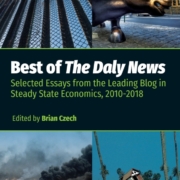Why Do So Many People Believe in the Fantasy of Infinite Growth on a Finite Planet?
by Rob Dietz
How do you feel about the economy these days? How about the environment? Do you think we’re sitting in a better spot than we were ten, twenty, or thirty years ago? It’s hard to find folks who are satisfied with either economic or environmental conditions. In the first place, the way we run the economy is producing appalling results. We have a mix of financial fiascos, unacceptable unemployment, and a dismal disparity between the haves and the have-nots. And if you’re not soiling yourself (or at least somewhat concerned) about what’s happening on land, sea and air, then you’re not paying much attention to the omnipresent signs of environmental breakdown.
Each day it becomes more apparent that we are on a misguided mission. Pursuit of perpetual economic growth is not a winning proposition for a lasting prosperity. Building a bigger economy can make sense in some circumstances, but always aiming to build a bigger economy means taking an ever-bigger chunk out of the earth’s ecosystems and the life-support services they provide. Why, then, do so many people believe in the fantasy of infinite growth on a finite planet? Is it because we can’t come up with a better idea? Is it because the rich and powerful have trapped the rest of us in their web of conspiracy? Is it because people are hopelessly greedy and materialistic?
At various times and places we might answer these questions affirmatively, but we can more commonly answer, “No, no, and no.” Putting aside conspiracy theories for the moment, there are three honest (but bogus) reasons why we pursue economic growth past the point of effectiveness and reason.
Bogus Reason #1: We think we have to have economic growth to create jobs.
People, and especially politicians, want jobs. We’ve used the blunt tool of economic growth to create jobs for decades, but do we really need economic growth to have good jobs? It’s true that there are typically more job openings in a growing economy, but there are other, less costly ways to make sure jobs are available. Growth, however, gives corporate elites an easy out. They can point to economic growth as the job creator while doing what they want without considering the impacts of their decisions on jobs.
If jobs are really the priority, then we wouldn’t replace people with machinery. And we wouldn’t eliminate service jobs to shift more and more burden onto people to serve themselves. My friend Chris works as a gas station attendant and provides a valuable service pumping gas for customers. He wouldn’t have a job, however, if he lived elsewhere. He happens to live in Oregon where the law says that only professional attendants can pump gas. In most states, gas station attendants have been replaced by customer labor and credit card readers. This sort of substitution has become commonplace in the name of efficiency — policy makers find it easier (or at least they’ve found it easier in the past) to avoid considering jobs explicitly. Just grow the economy and let Chris find a job elsewhere — that’s just the way it goes if his job is eliminated and the customer is forced to pick up the slack.
The truth is that we can have good jobs without producing and consuming evermore stuff. For starters, we can institute policies to make job-sharing an attainable reality. Many people would gladly trade some salary for more time. We can also stop the process of eliminating jobs through outsourcing and machinery-for-people swaps. Of course stopping this process would require a change in corporate incentives…
Bogus Reason #2: Screwy corporate incentives require growth.
Shareholder corporations are severely flawed. In my household, let’s say my overriding goal is to maximize my earnings. What would I do? I would take the highest paying job I could get. I certainly wouldn’t be involved in public policy or a not-for-profit enterprise. I wouldn’t spend much time with my wife or daughter — that would be time away from my career, and it could eat into my earnings (cue the Cat’s in the Cradle). If the goal is so single-focused, the results aren’t surprising. Profit maximization, whether it occurs in my household or in a corporation, produces perverse outcomes.
We know this about shareholder corporations. We know there are better ways to set up productive enterprises that have more worthy goals, but we don’t make the change. The reason is that we are addicted to two things corporations do well. First, we’re addicted to consumer novelty. We’ve gotta have the latest and greatest. People chase after I-phones, I-pods, I-pads, and plenty of other I-wants. Second, we’re addicted to receiving unearned income from investments in stocks or mutual funds. People who can afford it are invested in corporations. Their personal wealth is tied to the ability of corporations to grow. We’ve become accustomed to the idea of passive investment — we put extra money into an account and do absolutely nothing but watch the size of the account get bigger. Are we really entitled to get something for nothing?
Bogus Reason #3: We refuse to pay attention to the downsides of economic growth.
Few people are studying ecology and understanding how economic growth is degrading environmental resources. In fact, a whopping 21% percent of college students are business majors. And as Dr. Seuss noted in his classic book, The Lorax, “Business is business, and business must grow!” While we continue to tempt fate by disrupting and dismantling natural systems that we only partially understand, our attention is locked on the results of reality TV shows, Tiger Woods’s sex life, Jennifer Anniston’s and Justin Bieber’s haircuts, fairytale weddings of figurehead monarchs, and other matters of critical importance.
While we’re failing to pay attention, those who benefit most from growth — the corporate elites — will keep on doing what they do, and they’ll keep on selling it to the rest of us. If we don’t start asking, “why?” real soon, our kids will one day be asking “How did we let this happen?”
 Rob Dietz brings a fresh perspective to the discussion of economics and environmental sustainability. His diverse background in economics, environmental science and engineering, and conservation biology (plus his work in the public, private, and nonprofit sectors) has given him an unusual ability to connect the dots when it comes to the topic of sustainability. Rob is the author, with Dan O’Neill, of Enough Is Enough: Building a Sustainable Economy in a World of Finite Resources.
Rob Dietz brings a fresh perspective to the discussion of economics and environmental sustainability. His diverse background in economics, environmental science and engineering, and conservation biology (plus his work in the public, private, and nonprofit sectors) has given him an unusual ability to connect the dots when it comes to the topic of sustainability. Rob is the author, with Dan O’Neill, of Enough Is Enough: Building a Sustainable Economy in a World of Finite Resources.






Thank you. Excellent points, very concise. The problem still remains, how do we get people to start paying attention? The ‘Media’ and the ‘Market’ seem to hold so much control over the everyday lives of people, and it’s in there interest to keep people’s attention on the iWants…
For Gosh sakes, Mr. Dietz! Nobody really believes in infinite growth any more. That’s just a red herring thrown out to cheer people up, people who live on less than a dollar a day and who hope someday to live on less than two dollars a day. The “infinite” part really only applies to the small percentage of the world’s people who currently enjoy the use of some 40 percent of the world’s resources. The whole point of the economy’s intricate workings is to make sure that an infinite percentage of any growth that actually does occur will continue to flow into the bank accounts of this affluent elite! (Yes, yes, I know it’s not really “infinite” percent, just 100 percent, but “infinite” sounds so….rich!)
Why do you and your fellow dreamers think the US has more than 750 permanent military bases, established in over 100 countries around the world? Why does the US government constantly make up stories about imaginary enemies and ominous conspiracies to support a weapons budget larger than the rest of the world combined?
The easy answer, of course, is “Because we can afford it and it’s fun!” But there’s more to it than that. If there is any chance that economic growth might slow down a little – and I’m not admitting that possibility yet – that means there’s a possibility that the rate of increase in our share of the whole pie might slightly diminish. This is not only exactly the opposite of what every responsible economist says should happen, but it’s contrary to our habits, preferences, and inclinations, to quote the Constitution. This means we absolutely *must not* let it happen. I think even schoolchildren – in the US, at least – understand this by now.
The idea of infinite prosperity for everyone on Earth may be a little unrealistic, I’ll admit. Not everybody is going to be able to spend a month at Disneyland every year. But surely it’s better that some people live that way, rather than everybody pumping gas like your friend Chris. I mean, really, what are you going to suggest next, that Chris and his wife job-share the duties at the gas station in the interest of full employment and spend their spare time cultivating manioc root in their backyard? Seriously, there are parts of the world where the cultivation and preparation of manioc root have been perfected, and I vote for leaving that work to those who really know how to do it properly.
“we put extra money into an account and do absolutely nothing but watch the size of the account get bigger. Are we really entitled to get something for nothing?”
Good Question! Let me take a stab at an answer.
Money does not grow on trees, it is created by PRIVATE BANKS: loaned into existence as debt.
Banks charge interest on the money they create from nothing: Banksters are getting something (of yours) for their nothing.
The same people who own the banks use the money they create from nothing to buy politicians. They use their politicians to write and re-write laws to keep themselves and their servants fat and happy.
The same people who own the banks use the money they create from nothing to buy opinion makers and media outlets, TV networks, Newspapers, Magazines, Websites, etc. with which they keep 99.99% of the population confused about their state of wage slavery.
We are not getting something for nothing.
We are getting NOTHING for something.
End The FED. Its a start.
A good question and some thoughtful comments. I would like to add that the average American working person doesn’t have the time or energy or research and analyze the issue properly. Up early in the morning, eight to ten hours in the rat race, home in the evening to try and recoup or find some inexpensive recreation, go to bed, do it all over again tomorrow. Most people live in the “here and now”, not to mention that for the last 50,000 years, the human tendency has been to be preoccupied with day to day living. This is huge hurdle that is not made any easier to clear by the incessant distractions created by the money system’s propaganda machinery which tends to promote the “cornucopian” perspective exclusively.
There is a very good and provocative newsletter put out by an investment manager named Jeremy Grantham who, for an avowed capitalist, has a realistic perspective on what’s coming in the future. Grantham claims that we have recently encountered the “New Paradigm”. You can find a link to his newsletters here:
http://www.gmo.com/America
It has recently occurred to me that profit-mad persons become insatiable because money is a numerical abstraction and numbers are quite literally infinite. it follows that the amount of money imaginable to such persons (and therefore desirable to them) has literally no limit. the appetite for gain for such persons is equally infinite, even though their lives (and everything else in the physical world) are rather obviously finite.
i know that sounds simple and silly at best and insane at worst (and rather like a joke in any case) but i honestly think it actually has something to do with it. (no joke).
Capitalism requires an infinite growth paradigm because a steady-state economic system would end the primitive accumulation of excess capital. That’s also why capitalism needs spectacular busts; to restart the accumulation process. Capitalism is about infinite accumulation of excess production.
Capitalism been berry berry good to me and the rest of the country. “Standards of living” never been better. We live as Kings. But, capitalism’s hunger and greed knows no bound. The fantasy of infinite growth is intimately tied to the core philosophy of capital accumulation. I know, it’s third rail to challenge capitalism’s dogma, but I wish you would have addressed that explicitly.
Here’s why I think we humans are so resistant to letting go of the perpetual growth paradigm: it has made us (apparently) more wealthy and letting go of it makes us (apparently) less wealthy.
Our species has evolved with natural selection rewarding the genes whose host has figured out how to acquire wealth by, for instance, bringing home the jaguar – whether meat to feed the family or the car to lure the mate. My use of “(apparently)” is, of course, because externalized costs have made our valuation of wealth totally phony.
But unless and until we’re able to focus our intellects and values on overriding our genetic legacy of lusting for evermore wealth, the case for a steady state economy has no appeal. Therefore, I think the challenge is to persuade ourselves (1) that our (apparent) wealth is not real; (2) that we are better off with less of it; (3) that if we’re really smart (and perhaps lucky), we can end up with greater happiness, stable families, and strong communities.
I think that even those of us who believe in a steady state economy have trouble fully internalizing (1) and (2) above. It’s hard even for us, let alone the other 99.99…%.
This is a seemingly impossible challenge, but I appreciate everyone who’s trying, one way or another, to “crack the code” to move us toward sustainable.
I´m reminded of a former fellow classmate, a very pretty girl, who replied when I asked her, “Where do you think all th is civilization came from?” keeping in my mind the role of universities. She replied, “Corporations.”
As told by Mr. Dietz and in the movie The Corporation, most steady staters, and the non-consumerist NGO The New American Dream, many people are indoctrinated by mainstream advertising and faulty paradigms.
Dear Rob
I don’t believe that so many people believe in infinite growth. I do believe that so many CEO’s of public companies believe in infinite growth – to satisfy their shareholders’ greed. The larger corporations back governments and so the myth of infinite growth is perpetuated. Governments do nothing but encourage it.
Of course, most large corporations exist to supply consumers – you, me, the general population. So, the only way corporations can grow is if the population grows with them.
That why we hear nothing, NOTHING, about the root cause of most of the planet’s increasingly challenging issues – environmental breakdown, increasing pollution, expanding food and water crises…
Oh – what’s the root cause? I think we all know if we stop long enough to ask ourselves the question – overpopulation.
Any growth, even 0.1 percent per year, becomes infinite if perpetuated long enough. Our only true survival prospect, as a species, is to achieve steady state.
The only true way to do so is to stop growing the population.
Now, there’s a challenge!
Peter
In the last century we were blessed to have with us the futurist and great thinker Buckminster Fuller. Bucky said that Humanity could be a Success on Spaceship Earth through forward and imaginative thinking and seeing ourselves as global citizens. Just as we r citizens of a city..we r also citizens of a state..and also we r citizens of a nation. Why can’t we also see ourselves as members of a Planet. Earth Men ..Earth Women and Earth Children and stil kéep our Countries Earth Community…Why Not?